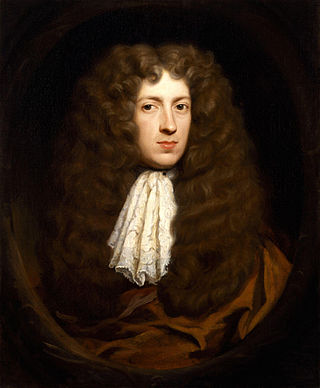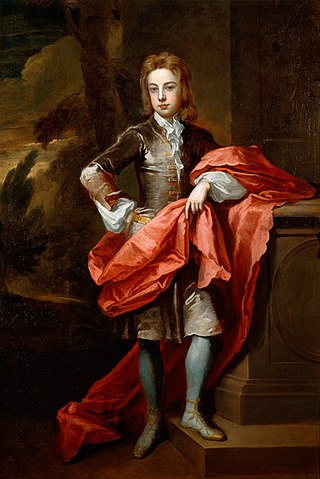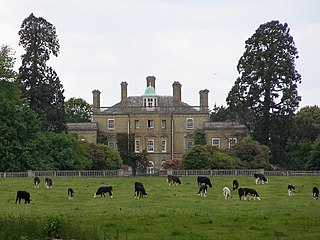Related Research Articles

Sir Gilbert Heathcote, 1st Baronet was an English merchant and Whig politician who sat in the English and British House of Commons between 1701 and 1733. He also served as the governor of the Bank of England and was Lord Mayor of London in 1711.
Sir William Withers of Fulham, Middlesex, was an English linen draper and Tory politician who sat in the English and British House of Commons between 1701 and 1715. He was Lord Mayor of London from 1707 to 1708.
Lieutenant-General Harry Mordaunt was an English Army officer and Whig politician who sat in the English and British House of Commons between 1692 and 1720.
Sir Francis Dashwood, 1st Baronet, of St. Botolph without Bishopsgate, London, and West Wycombe, Buckinghamshire, was a British merchant, landowner and Whig politician who sat in the House of Commons from 1708 to 1713.

James Vernon was an English Whig politician who sat in the English and British House of Commons between 1679 and 1710. He was Secretary of State for both the Northern and the Southern Departments during the reign of William III.

James Vernon the Younger was a British government official, courtier, diplomat and Whig politician who sat in the House of Commons from 1708 to 1710. He was an envoy to Denmark from 1702 to 1707.
The Blackwell Baronetcy, of Sprowston in the County of Norfolk, was a title in the Baronetage of Great Britain.
Sir James Montagu, of the Middle Temple, London, was an English lawyer and Whig politician, who sat in the House of Commons at various times between 1695 and 1713. He became a judge and also served as Solicitor General and Attorney General.
Sir John Holland, 2nd Baronet, of Quidenham Hall, Norfolk was a British Whig politician who sat in the English and British House of Commons from 1701 to 1710.

Thomas Coke of Melbourne Hall, Melbourne, Derbyshire was an English courtier and politician who sat in the House of Commons between 1698 and 1715. Although a Tory on paper, he was prepared to support the Whigs in order to keep hold of his public offices.

William Monson, of Broxbourne, Hertfordshire, was an English Whig politician who sat in the English House of Commons between 1695 and 1707 and in the British House of Commons between 1708 and 1722.

Sir Justinian Isham, 4th Baronet was an English landowner and Tory politician, who sat in the House of Commons almost continuously from 1685 until his death in 1730. He was the longest serving member, later termed Father of the House, from 1729 to 1730.
Sir Rushout Cullen, 3rd Baronet (1661–1730), of Upton, Ratley, Warwickshire and Isleham, Cambridgeshire, was an English landowner and Whig politician who sat in the English and British House of Commons between 1697 and 1710.

Anthony Henley was an English Whig politician who sat in the English and British House of Commons between 1698 and 1711. He was noted as a wit.
Major Anthony Morgan of Freshwater, Isle of Wight was a British Army officer, and Whig politician who sat in the House of Commons between 1695 and 1729. He was a Lieutenant-Governor of the Isle of Wight.

Ralph Freman (1666–1742), of Aspenden Hall and Hamels, Hertfordshire, was an English politician who sat in the English and British House of Commons for 30 years from 1697 to 1727.

Sir Arthur Owen, 3rd Baronet, of Orielton, Pembrokeshire, was a Welsh Whig politician who sat in the English and British House of Commons between 1695 and 1727.

Sir James Worsley, 5th Baronet (1672–1756), of Pylewell Park, Hampshire, was a British landowner and politician who sat in the English and British House of Commons between 1696 and 1741. He tended to support whichever administration was in power.

Matthew Ducie Moreton, 1st Baron Ducie (1663–1735) of Moreton, Staffordshire, and Tortworth, Gloucestershire, was a British Army officer and politician who sat in the House of Commons between 1708 and 1720 when he was raised to the peerage as Baron Ducie.
Sir Robert Kemp, 3rd Baronet (1667–1734), of Hoxne and Ubbeston, Suffolk, was an English landowner and Tory politician who sat in the House of Commons between 1701 and 1734.
References
- 1 2 3 Cokayne, George Edward, ed. (1906), Complete Baronetage volume 5 (1707–1800), vol. 5, Exeter: William Pollard and Co, retrieved 9 October 2018
- ↑ "Britain to Close a Consulate With a View". New York Times . 26 April 2011. Retrieved 28 April 2011.
- 1 2 "BLACKWELL, Sir Lambert (d. 1727), of St. James's, Westminster and Sprowston Hall, Norf". History of Parliament Online. Retrieved 19 August 2019.